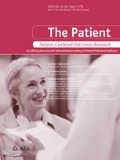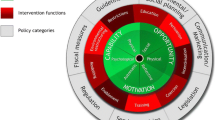Abstract
Background
Trusting relationships between mental health consumers and health care providers are critical in the management and recovery process. Although community pharmacy staff are well placed to form relationships with mental health consumers and carers, little is known about the existence, nature or significance of consumer–staff relationships.
Objectives
The aim of this study was to explore mental health consumers’ and carers’ perceptions of community pharmacy services, and describe the nature of their relationships with pharmacy staff.
Methods
Focus groups and semi-structured interviews were conducted with a convenience sample of 74 mental health consumers or carers who self-selected into the study. Thematic analysis was undertaken to explore participants’ perspectives.
Results
Positive experiences of pharmacy services were perceived to encourage consumers’ and carers’ trust in pharmacists and promote relationship development. This was enhanced when participants felt that elements of patient-centred care were part of the pharmacy services provided. Although some participants perceived community pharmacy to have a limited role in mental health, those who had established relationships highlighted the current role of pharmacists in their care, and appeared to welcome further extensions of pharmacists’ role in mental health.
Conclusions
Trusting relationships between consumers and carers and community pharmacy staff were deemed to be important in mental health care and contributed to consumers’ and carers’ views of pharmacy as a safe health care space. Community pharmacy services that included core elements of patient-centred care appeared to facilitate relationship formation and associated benefits. Education and training is needed for community pharmacy staff to improve mental health knowledge and promote positive engagement with consumers and carers.
Similar content being viewed by others
Notes
Mental Health First Aid™ is the assistance provided to a person developing a mental health problem or in a mental health crisis, until appropriate professional treatment is received or until the crisis resolves.
References
Ardito RB, Rabellino D. Therapeutic alliance and outcome of psychotherapy: historical excursus, measurements, and prospects for research. Front Psychol. 2011. doi:10.3389/fpsyg.2011.00270.
Chewning B, Sleath B. Medication decision-making and management: a client-centered model. Soc Sci Med. 1996;42(3):389–98.
Hall MA, Dugan E, Zheng B, Mishra AK. Trust in physicians and medical institutions: what is it, can it be measured, and does it matter? Milbank Q. 2001;79(4):613–39.
Kai J, Crosland A. Perspectives of people with enduring mental ill health from a community-based qualitative study. Br J Gen Pract. 2001;51(470):730–6.
Keller SM, Zoellner LA, Feeny NC. Understanding factors associated with early therapeutic alliance in PTSD treatment: adherence, childhood sexual abuse history, and social support. J Consult Clin Psychol. 2010;78(6):974–9.
Kerse N, Buetow S, Mainous 3rd AG, Young G, Coster G, Arroll B. Physician-patient relationship and medication compliance: a primary care investigation. Ann Fam Med. 2004;2(5):455–61.
Noiseux S, Tribble St-Cyr D, Corin E, St-Hilaire P-L, Morissette R, Leclerc C, Fleury D, Vigneault L, Gagnier F. The process of recovery of people with mental illness: the perspectives of patients, family members and care providers: part 1. BMC Health Serv Res. 2010. doi:10.1186/1472-6963-10-161.
Oades L, Deane F, Crowe T, Lambert WG, Kavanagh D, Lloyd C. Collaborative recovery: an integrative model for working with individuals who experience chronic and recurring mental illness. Australas Psychiatry. 2005;13(3):279–84.
Poochikian-Sarkissian S, Sidani S, Ferguson-Pare M, Doran D. Examining the relationship between patient-centred care and outcomes. Can J Neurosci Nurs. 2010;32(4):14–21.
Ramon S, Healy B, Renouf N. Recovery from mental illness as an emergent concept and practice in Australia and the UK. Int J Soc Psychiatry. 2007;53(2):108–22.
Thompson L, McCabe R. The effect of clinician-patient alliance and communication on treatment adherence in mental health care: a systematic review. BMC Psychiatry. 2012;12:87.
Gilburt H, Rose D, Slade M. The importance of relationships in mental health care: a qualitative study of service users’ experiences of psychiatric hospital admission in the UK. BMC Health Serv Res. 2008;8:92.
Denhov A, Topor A. The components of helping relationships with professionals in psychiatry: users’ perspective. Int J Soc Psychiatry. 2012;58(4):417–24.
Garfield S, Francis S, Smith F. Building concordant relationships with patients starting antidepressant medication. Patient Educ Couns. 2004;55(2):241–6.
Australia. PGo. The roadmap: the strategic direction for community pharmacy. Available from: http://www.guild.org.au/iwov-resources/documents/The_Guild/PDFs/News%20and%20Events/Publications/The%20Roadmap/Roadmap.pdf. Accessed 6 Apr 2010.
Mechanic D, Meyer S. Concepts of trust among patients with serious illness. Soc Sci Med. 2000;51(5):651–68.
Mechanic D. Public trust and initiatives for new health care partnerships. Milbank Q. 1998;76(2):281–302.
Gilson L. Trust and the development of health care as a social institution. Soc Sci Med. 2003;56(7):1453–68.
Fiscella K, Meldrum S, Franks P, Cleveland GS, Duberstein P, McDaniel SH, Epstein RM. Patient trust: is it related to patient-centered behavior of primary care physicians? Med Care. 2004;42(11):1049–55.
Mead N, Bower P. Patient-centred consultations and outcomes in primary care: a review of the literature. Patient Educ Couns. 2002;48(1):51–61.
Mead N, Bower P. Patient-centredness: a conceptual framework and review of the empirical literature. Soc Sci Med. 2000;51(7):1087–110.
Morgan S, Yoder LH. A concept analysis of person-centered care. J Holist Nurs. 2012;30(1):6–15.
Schnur JB, Montgomery GH. A systematic review of therapeutic alliance, group cohesion, empathy, and goal consensus/collaboration in psychotherapeutic interventions in cancer: uncommon factors? Clin Psychol Rev. 2010;30(2):238–47.
Worley MM, Schommer JC, Brown LM, Hadsall RS, Ranelli PL, Stratton TP, Uden DL. Pharmacists’ and patients’ roles in the pharmacist-patient relationship: are pharmacists and patients reading from the same relationship script? Res Social Admin Pharm. 2007;3(1):47–69.
Krska J, Morecroft CW. Views of the general public on the role of pharmacy in public health. J Pharm Health Serv Res. 2010;1(1):33–8.
Wirth F, Tabone F, Azzopardi LM, Gauci M, Zarb-Adami M, Serracino-Inglott A. Consumer perception of the community pharmacist and community pharmacy services in Malta. J Pharm Health Serv Res. 2010;1(4):189–94.
Agomo CO. The role of community pharmacists in public health: a scoping review of the literature. J Pharm Health Serv Res. 2012;3(1):25–33.
Alghurair SA, Simpson SH, Guirguis LM. What elements of the patient-pharmacist relationship are associated with patient satisfaction? Patient Prefer Adherence. 2012;6:663–76.
Hall MA, Zheng B, Dugan E, Camacho F, Kidd KE, Mishra A, Balkrishnan R. Measuring patients’ trust in their primary care providers. Med Care Res Rev. 2002;59(3):293–318.
McMillan S, Kendall E, Sav A, King MA, Whitty JA, Kelly F, Wheeler AJ. A systematic review of the outcomes from patient-centred approaches to health care. Med Care Res Rev. 2013. doi:10.1177/1077558713496318.
Human Capital Alliance. Analysis of secondary data to understand pharmacy workforce supply: Initial supply report. Available from: http://www.humancapitalalliance.com.au/documents/Initial%20Supply%20Report%20final%20-%2022102008.pdf. Accessed 7 May 2008.
Mental Health and Community Pharmacy Project. Mental health and community pharmacy project. Available from: http://www.mentalhealthproject.com.au/. Accessed 30 Nov 2011.
Britt SH. How to conduct consumer and opinion research: the sampling survey in operation. Psychol Bull. 1947;44(4):391.
Dolores MA, Tongco C. Purposive sampling as a tool for informant selection. Ethnobotany Res Appl. 2007;5:147–58.
Kitzinger J. Qualitative research: introducing focus groups. BMJ. 1995;311(7000):299–302.
Mauthner NS, Doucet A. Reflexive accounts and accounts of reflexivity in qualitative data analysis. Sociology. 2003;37(3):413–31.
Pope C, Ziebland S, Mays N. Qualitative research in health care: analysing qualitative data. BMJ. 2000;320(7227):114–6.
Lester H, Gask L. Delivering medical care for patients with serious mental illness or promoting a collaborative model of recovery? Br J Psychiatry. 2006;188:401–2.
Knox K, Fejzic J, Mey A, Fowler J, Kelly F, McConnell D, Hattingh L, Wheeler A. Mental health consumer and caregiver perceptions of stigma in Australian community pharmacies. Int J Soc Psychiatry. 2013. doi:10.1177/0020764013503149.
Crump K, Boo G, Liew FS, Olivier T, So C, Sung JY, Wong CH, Shaw J, Wheeler A. New Zealand community pharmacists’ views of their roles in meeting medicine-related needs for people with mental illness. Res Social Admin Pharm. 2011;7(2):122–33.
Pharmaceutical Society of Australia. Mental health care framework. Available from: http://www.psa.org.au/archives/21010. Accessed 4 Apr 2013.
Cates ME, Burton AR, Woolley TW. Attitudes of pharmacists toward mental illness and providing pharmaceutical care to the mentally ill. Ann Pharmacother. 2005;39(9):1450–5.
Phokeo V, Sproule B, Raman-Wilms L. Community pharmacists’ attitudes toward and professional interactions with users of psychiatric medication. Psychiatr Serv. 2004;55(12):1434–6.
Scheerder G, De Coster I, Van Audenhove C. Pharmacists’ role in depression care: a survey of attitudes, current practices, and barriers. Psychiatr Serv. 2008;59(10):1155–60.
University of South Australia. Consumer experiences, needs and expectations of community pharmacy. Available from: http://www.guild.org.au/iwov-resources/documents/The_Guild/PDFs/CPA%20and%20Programs/3CPA%20General/2005-501/Final%20Rept_8Mar06.pdf. Accessed 6 Apr 2011.
Pharmacy Guild of Australia. Pharmacy Practice Incentives. Available from: http://www.guild.org.au/The_Guild/tab-Pharmacy_Services_and_Programs/Practice_Incentives/Pharmacy+Practice+Incentives.page? Accessed 16 Jun 2012.
Pharmacy Guild of Australia. Pharmacy assistant training. Available from: http://www.guildtraining.com.au/sites/Guild_Training/Pharmacy%20Assistants%20Training/Pharmacy%20Assistant%20Training.page. Accessed 1 Apr 2012.
Pharmacy Guild of Australia. Quality care pharmacy program. Available from: http://www.qcpp.com/QCPP/Resources/Training+and+QCPP/Training_and_QCPP.page. Accessed 20 Apr 2010.
Pharmaceutical Society of Australia. Certificates in community pharmacy. Available from: http://www.psa.org.au/education/certificates-and-diplomas/community-pharmacy. Accessed 17 Apr 2012.
Open Colleges. Certificate in retail pharmacy assistant. Available from: http://www.opencolleges.edu.au/business-administration-courses/retail-pharmacy-assistant-course.aspx. Accessed 17 Apr 2012.
Mey A, Fowler J, Knox K, Shum DK, Fejzic J, Hattingh L, McConnell D, Wheeler AJ. Review of community pharmacy staff educational needs for supporting mental health consumers and carers. Community Ment Health J. 2013. doi:10.1007/s10597-012-9580-4.
Buetow S. Health research methods: a tabular presentation. Nova Biomedical Books: South Carolina; 2007.
Acknowledgments
This project was funded by the Australian Government Department of Health and Ageing, as part of the Fifth Community Pharmacy Agreement Research and Development Program managed by The Pharmacy Guild of Australia, grant RTF 2010/11-02 to Prof. Wheeler. The financial assistance provided must not be taken as endorsement of the contents of this report.The authors acknowledge the members of the Advisory Panel and Reference Group for their guidance and support, and the consumers and carers who participated in this study. The authors thank Brad McConachie and Rhonda Knights for providing administrative support.
Declarations
All authors were employees of Griffith University and provided input on study design, and reviewed and approved the manuscript. Ms. Mey, Dr. Knox and Dr. Kelly were responsible for the data analysis, interpretation and manuscript preparation. Ms. Mey was responsible for creating the first draft of the manuscript under the supervision of Prof. Davey. Prof. Wheeler has approved the overall content as the project leader. There are no conflicts of interest.
Author information
Authors and Affiliations
Corresponding author
Rights and permissions
About this article
Cite this article
Mey, A., Knox, K., Kelly, F. et al. Trust and Safe Spaces: Mental Health Consumers’ and Carers’ Relationships with Community Pharmacy Staff. Patient 6, 281–289 (2013). https://doi.org/10.1007/s40271-013-0032-1
Published:
Issue Date:
DOI: https://doi.org/10.1007/s40271-013-0032-1




